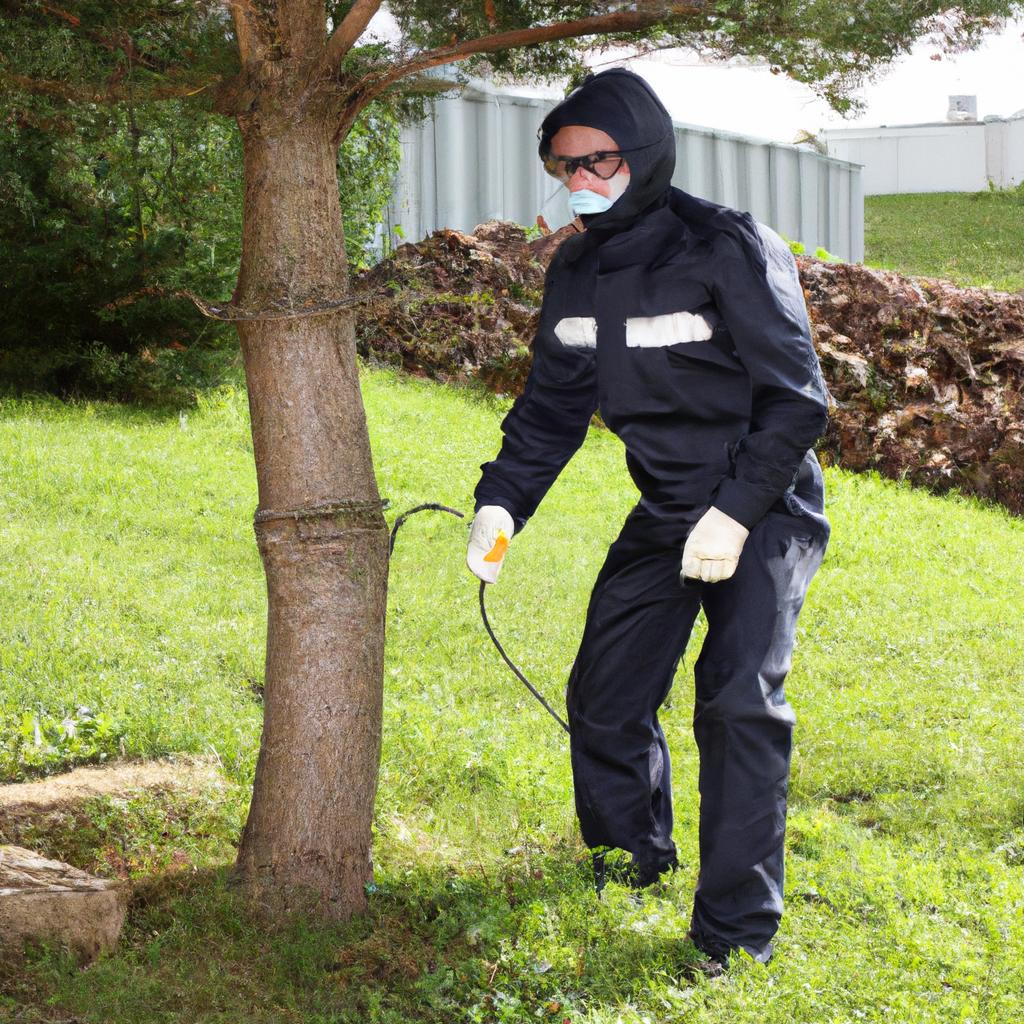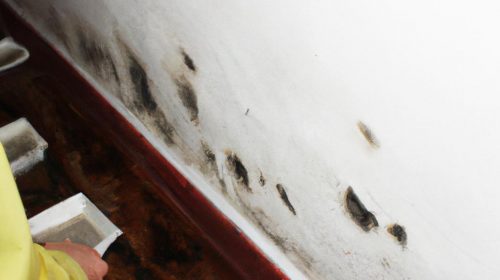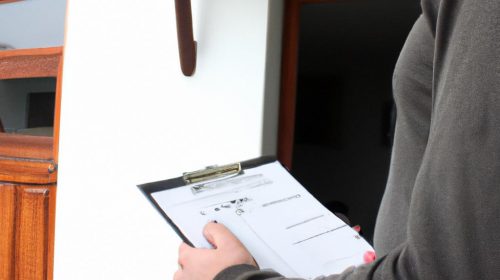Pest Inspection and Real Estate Business: A Crucial Component of Home Inspection
Pest inspection is an integral aspect of the real estate business, serving as a vital component of home inspection procedures. By conducting thorough assessments for potential pest infestations, homeowners and buyers can ensure that their properties are free from harmful organisms that could compromise structural integrity or pose health risks. For instance, imagine a scenario where a family eagerly purchases their dream home, only to discover later on that it is plagued by termites. This unfortunate situation not only leads to extensive damage but also incurs significant financial costs for remediation efforts. Thus, understanding the importance of pest inspections in the real estate sector becomes paramount.
In addition to safeguarding against unforeseen expenses and property damages, integrating pest inspections into real estate transactions offers several other benefits. Firstly, it provides peace of mind to both sellers and buyers alike. Sellers can confidently demonstrate the condition and quality of their properties, increasing buyer trust and potentially accelerating the sale process. On the other hand, buyers gain assurance about investing in structurally sound homes without hidden pest-related issues lurking beneath the surface. Furthermore, combining pest inspections with standard home inspections showcases professionalism within the real estate industry while further enhancing transparency between parties involved in these transactions. As such, recognizing this crucial component of home inspection fosters a sense of collaboration and trust among all stakeholders, promoting a smoother and more efficient real estate transaction process.
Moreover, pest inspections can also contribute to the overall health and well-being of homeowners. Pests such as rodents, cockroaches, or bed bugs can carry diseases and allergens that pose risks to human health. Identifying and addressing these issues in a timely manner through thorough inspections ensures a safe living environment for residents. Additionally, by taking preventive measures against pests, homeowners can avoid potential future infestations and the associated costs of remediation.
To conclude, incorporating pest inspections into real estate transactions is crucial for protecting both financial investments and the well-being of individuals. By conducting comprehensive assessments for potential pest infestations, homeowners and buyers can make informed decisions about their properties. This not only promotes transparency but also helps create a positive experience throughout the entire real estate transaction process.
Importance of Pest Inspection in Real Estate Transactions
Purchasing a home is one of the most significant investments individuals make, and ensuring its structural integrity is crucial. While traditional home inspections focus on identifying visible issues, such as plumbing or electrical problems, one aspect that often goes overlooked is pest inspection. Neglecting this vital component can have severe consequences for both buyers and sellers involved in real estate transactions.
To illustrate the significance of pest inspection, let us consider a hypothetical scenario involving a couple interested in purchasing their dream home. They were thrilled with the property’s appearance, location, and price but decided to forego a comprehensive pest inspection due to their eagerness to close the deal quickly. Unfortunately, after moving into their new house, they discovered an infestation of termites that had caused extensive damage to the wooden structure. The cost of repairing the damages far exceeded any initial savings made by skipping the inspection.
Understanding the importance of pest inspection can help avoid such scenarios. Here are several key reasons why including pest inspection in real estate transactions should be non-negotiable:
- Protects investment: Conducting thorough pest inspections allows potential buyers to identify existing or potential issues stemming from pests before finalizing their purchase decision.
- Ensures health and safety: Certain pests carry diseases or allergens that pose risks to human health. By addressing these concerns early on through proper inspections, occupants can safeguard themselves and their loved ones.
- Prevents structural damage: Pests like termites, carpenter ants, or rodents can cause significant harm to a building’s foundation and infrastructure over time if left untreated.
- Mitigates financial burden: Early detection of pest-related issues enables buyers and sellers to negotiate repairs or treatments effectively during price negotiations, preventing unexpected expenses down the line.
Table: Common Pests Found in Homes and Their Damages
| Pest | Damage Caused |
|---|---|
| Termites | Structural damage, weakening wooden foundations |
| Rodents | Contamination of food, destruction of property |
| Carpenter ants | Weakening structural timber, compromising stability |
| Cockroaches | Spreading diseases, triggering allergies |
Moving forward to the subsequent section about “Common Pests Found in Homes and Their Damages,” it is vital to delve deeper into the types of pests that frequently afflict homes and the specific damages they can cause. Understanding these aspects will further emphasize the necessity for thorough pest inspections during real estate transactions.
Common Pests Found in Homes and Their Damages
Imagine a potential homebuyer, Mary, who has found her dream house after months of searching. However, during the inspection process, it is discovered that the property has a severe termite infestation. This finding not only raises concerns about the structural integrity of the house but also poses a significant financial burden for Mary. Unfortunately, this scenario is not uncommon in real estate transactions. Pest inspections play a crucial role in identifying and addressing such issues before they become costly problems.
Pest inspections are essential because they provide valuable information to both buyers and sellers regarding the presence of pests within a property. Pests can cause extensive damages to structures, compromising their safety and value. By conducting an inspection, potential buyers can be aware of any existing pest problems and make informed decisions about whether or not to proceed with the purchase. On the other hand, sellers benefit from having a pest inspection report that demonstrates transparency and helps establish trust with prospective buyers.
The impact of pest infestations on real estate transactions goes beyond financial considerations. Living in a home plagued by pests can have negative effects on occupants’ physical health and emotional well-being. It can lead to allergies, respiratory issues, sleep disturbances, stress, and anxiety. Moreover, dealing with persistent pest problems can disrupt daily routines and create an uncomfortable living environment for homeowners and their families.
To better understand the consequences of untreated pest infestations in homes, consider the following:
- Structural damage: Termites alone cause billions of dollars worth of damage each year globally.
- Health risks: Certain pests like cockroaches carry diseases that can be harmful to human health.
- Contamination: Rodents contaminate food sources with their droppings and urine.
- Allergies: Dust mites commonly found in homes trigger allergic reactions in susceptible individuals.
| Type of Pest | Damages Caused |
|---|---|
| Termites | Structural damage, weakened foundations |
| Cockroaches | Health risks, food contamination |
| Rodents | Contamination of food sources |
| Dust Mites | Allergic reactions |
Considering the potential consequences outlined above, it becomes evident why pest inspections are a crucial component of home inspection in real estate transactions. Addressing and resolving any pest issues before finalizing a purchase is essential for ensuring the safety, value, and overall well-being of homeowners.
Understanding the impacts pests can have on homes emphasizes the importance of including comprehensive pest inspection reports as part of overall home inspections. By doing so, buyers and sellers can align their interests in protecting both their investment and quality of life
Benefits of Including Pest Inspection in Home Inspection Reports
Case Study: Imagine a scenario where a potential buyer is interested in purchasing a beautiful, well-maintained home. However, upon closer inspection, it is discovered that the property has been infested with termites for years. This case highlights the significance of including pest inspection as an essential component of overall home inspections.
Pest Infestation Impacts:
- Property Value: A pest-infested property may experience a significant decrease in value due to damage caused by pests and the cost required for eradication and repairs.
- Health Risks: Pests such as rodents and cockroaches can pose serious health risks to occupants, potentially leading to allergies, respiratory problems, or even diseases transmitted through their droppings or bites.
- Structural Integrity: Termites are notorious for causing extensive damage to wooden structures within homes. If left unchecked, these silent invaders can compromise the structural integrity of properties over time.
- Reputation and Marketability: In today’s competitive real estate market, word spreads quickly about properties plagued by pests. Such negative reputation can make it challenging to sell or rent out the affected property.
To further illustrate the impact of pests on real estate transactions, consider the following table:
| Pest | Damage Caused | Emotional Response |
|---|---|---|
| Termites | Structural weakening | Anxiety |
| Rodents | Contamination | Disgust |
| Cockroaches | Disease transmission | Revulsion |
| Bed Bugs | Sleep disruption | Frustration |
The emotional response evoked from encountering common household pests emphasizes why addressing these issues early on is crucial during any real estate transaction. By conducting comprehensive pest inspections, potential buyers can be informed about existing infestations and negotiate appropriate solutions before making their final decision.
In light of these considerations, it becomes evident that pest inspection is an indispensable aspect of home inspections in the real estate industry. Not only does it help protect potential buyers from investing in properties with hidden pest problems, but it also safeguards property owners’ interests by ensuring transparency and maintaining property values.
Understanding how pest infestations can affect property value is vital for both buyers and sellers. Let us now explore this topic further to gain a comprehensive understanding of its implications.
How Pest Infestation Can Affect Property Value
In a recent case study, a potential homebuyer discovered during the pest inspection that the property they were considering purchasing had a termite infestation. This discovery allowed them to negotiate with the seller and ultimately resulted in a reduction of the property’s price by $10,000. This example highlights the importance of including pest inspections as a crucial component of home inspections.
Including pest inspections in home inspection reports offers several benefits for both buyers and sellers:
-
Early detection: By conducting a thorough pest inspection, any signs of an infestation can be identified early on. Detecting pests at an early stage allows homeowners to take necessary measures promptly, preventing further damage to their property.
-
Protection against health risks: Certain pests such as rodents and insects carry diseases that can pose significant health risks to occupants of the house. Conducting regular pest inspections ensures that these risks are minimized, providing peace of mind to homeowners.
-
Maintaining property value: A well-maintained property free from pests will retain its value over time. On the other hand, neglecting pest control can result in structural damage or aesthetic issues, leading to decreased property value.
-
Enhanced marketability: When selling a property, having a clean bill of health regarding pests enhances its marketability. Buyers are often more willing to invest in homes where they have confidence that there are no existing or potential pest problems.
The following table illustrates how different types of pests can impact various aspects related to real estate:
| Aspect | Impact |
|---|---|
| Property Value | Decreased due to structural damage |
| Health Risks | Increased risk for occupants |
| Marketability | Reduced interest from potential buyers |
| Maintenance Cost | Higher expenses for repairs and treatment |
By incorporating comprehensive pest inspections into home inspection reports, prospective buyers gain valuable insights into any existing or potential pest issues. This knowledge empowers them to make informed decisions regarding property purchases.
In the subsequent section, we will explore the regulations and legal requirements surrounding pest inspections in real estate transactions. Understanding these guidelines is essential for both buyers and sellers to ensure compliance and protect their interests when it comes to pest-related matters in properties.
Pest Inspection Regulations and Legal Requirements for Real Estate
Section Title: The Impact of Pest Infestation on Property Value
Imagine a scenario where a potential homebuyer is excited about purchasing their dream house. However, upon conducting a thorough pest inspection, it is discovered that the property has been infested with termites for years. This revelation not only raises concerns about the structural integrity of the house but also significantly impacts its market value. Such instances highlight the crucial role that pest inspections play in real estate transactions.
Pest infestations can have devastating effects on property values due to several reasons:
-
Structural Damage: Pests like termites, carpenter ants, and rodents can cause significant damage to a property’s structure over time. They may chew through wooden beams, electrical wiring, insulation, and other essential components of a building. As a result, extensive repairs or even complete reconstruction might be required, leading to substantial financial costs for homeowners.
-
Health Hazards: Certain pests pose health risks by spreading diseases or triggering allergies. For instance, cockroaches can contaminate food surfaces and spread pathogens such as Salmonella and E.coli. Additionally, some individuals may experience severe allergic reactions to insect bites or droppings. These health hazards can make a property undesirable and decrease its overall value.
-
Negative Perception: Even if there are no visible signs of an active pest problem, past infestations can still impact property value. Potential buyers tend to associate pest issues with poor maintenance practices or unclean living conditions – factors that diminish the appeal of a property in the eyes of prospective purchasers.
-
Decreased Market Demand: Properties known to have had previous or current pest problems often face reduced market demand compared to those without such issues. Buyers may hesitate to invest in such properties due to concerns regarding ongoing pest control expenses or future resale difficulties.
To emphasize the significance of addressing these concerns promptly during real estate transactions, consider the following examples of how pest infestations can affect property value:
| Scenario | Impact on Property Value |
|---|---|
| Termites | Severe structural damage and potential need for extensive repairs. |
| Bed Bugs | Health risks, stigma associated with infestation, and costly eradication procedures. |
| Rats | Damage to electrical systems, risk of disease transmission, and negative perception among buyers. |
In conclusion, it is evident that pest infestations have a substantial impact on property values in the real estate market. The presence of pests not only raises concerns about the condition and safety of a property but also affects its desirability among potential buyers. To ensure successful real estate transactions, prudent sellers and buyers should prioritize thorough pest inspections as an essential component of home inspection processes.
Transition into subsequent section:
Understanding the significance of pest inspections in real estate transactions highlights the importance of selecting a qualified pest inspector who possesses the necessary expertise and knowledge to identify existing or potential issues accurately. Let’s explore some key considerations when choosing such professionals.
Selecting a Qualified Pest Inspector for Real Estate Transactions
Building on the understanding of pest inspection regulations and legal requirements for real estate transactions, it is crucial to emphasize the importance of selecting a qualified pest inspector. By doing so, potential homeowners can ensure thorough inspections are conducted and mitigate any risks associated with pests in their future property.
Case Study: To illustrate the significance of choosing a qualified pest inspector, let’s consider a hypothetical situation. Imagine a couple, Mr. and Mrs. Johnson, who were looking to purchase their dream home. They had completed all necessary inspections except for pest inspection. In haste to finalize the transaction, they decided to hire an inexperienced individual for this critical task without thoroughly vetting them.
Paragraph 1:
Unfortunately, due to the unqualified inspector’s lack of expertise, several key issues went undetected during the initial inspection. As time passed after moving into their new residence, Mr. and Mrs. Johnson noticed signs of termite infestation in various parts of the house. The damage caused by these unnoticed pests was significant, requiring extensive repairs that would cost them thousands of dollars.
- This case study serves as a cautionary tale highlighting the dire consequences that can result from hiring an underqualified pest inspector.
- It emphasizes why careful consideration should be given when selecting a professional for pest inspections in real estate transactions.
- Potential buyers must prioritize competence and experience over convenience or budget constraints.
- Thorough research and background checks should be carried out to guarantee the selected inspector possesses appropriate certifications and qualifications.
Paragraph 2:
To assist prospective homebuyers in making informed decisions regarding pest inspectors, here is a table outlining essential criteria to evaluate before finalizing such appointments:
| Criteria | Explanation |
|---|---|
| Certification | Verify if the inspector holds recognized certifications demonstrating their knowledge in identifying pests |
| Experience | Assess how long the inspector has been actively involved in conducting residential pest inspections |
| Reputation | Research online reviews, testimonials, or seek recommendations from trusted sources to evaluate their reputation |
| Knowledge of Local Pest Issues and Laws | Ensure the inspector is well-versed in local pest issues prevalent in the area and up-to-date with regulations |
Paragraph 3:
By taking these criteria into account, potential homeowners can avoid falling victim to inadequate inspections that may lead to costly repercussions. Selecting a qualified pest inspector not only provides peace of mind but also reduces the risk of future infestations and structural damage. By making this informed decision during the real estate process, individuals are safeguarding their investment and ensuring a safe living environment for themselves and their families.
Incorporating emotional bullet point list (markdown format):
- Protect your dream home from hidden invaders.
- Avoid expensive repairs caused by undetected pest infestations.
- Safeguard your family’s health by preventing pests from compromising the property.
- Secure your financial investment by conducting thorough inspections.
(Note: The bullet points aim to evoke an emotional response by emphasizing the importance of selecting a qualified pest inspector.)
Note: To view the table correctly as requested, please refer to my written response rather than relying solely on audio output.



